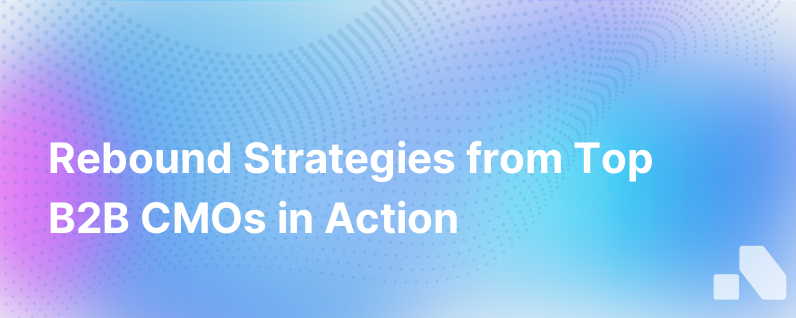
In the ever-evolving arena of B2B marketing, the role of the Chief Marketing Officer (CMO) is becoming increasingly complex and consequential. CMOs are not just the guardians of brand and campaign managers; they are now seen as key drivers of growth, innovation, and digital transformation.
Amidst this backdrop, there's been a significant shift in how B2B CMOs approach their strategies, particularly in response to unforeseen challenges such as global economic downturns or the global pandemic. To stay ahead, it's paramount for CMOs to rebound both their mindsets and their action plans, paving the path for resilient, adaptable, and innovative B2B marketing.
It's Time to Revamp the CMO Mindset
Embrace Agile Marketing
With uncertainty being the only certainty, agility is more than a methodology—it’s a marketing mindset. B2B CMOs should adopt an iterative approach that enables quick reactions to market changes. This mindset allows for rapid experimentation, the ability to scale successes and to nimbly shift away from what doesn’t work.
From Data-Driven to Data-Enlightened
Being data-driven is the standard; the next evolution is to become data-enlightened. This means not just using data to inform decisions but using it to predict, personalize, and enhance every customer interaction. It's not enough to know what happened; CMOs must anticipate what will happen next.
Cultivate Resilience
The new CMO mantra pivots on resilience. In the face of disruption, marketing leaders must embody a blend of toughness and flexibility, ensuring that both their teams and their strategies can pivot and persevere through adversity.
Sustainability and Purpose
For modern consumers and businesses alike, purpose and sustainability aren’t just nice-to-have, they are imperatives. CMOs must integrate these values deeply within their brand stories and operational practices, reflecting an authentic commitment to societal impact.
Action Plans for the Proactive B2B CMO
To complement this shifted mindset, CMOs need robust action plans aligned with these new realities. Here's how CMOs can recalibrate their strategies:
Accelerate Digital Transformation
Digital channels and tactics are permanently etched into the fabric of B2B marketing. CMOs must continue to innovate in the digital space, leveraging the power of AI and machine learning for predictive analytics, enhancing customer experiences, and optimizing spend.
Focus on Customer Experience
CX is the new battleground for differentiation. This means that CMOs need to champion seamless, omnichannel experiences that resonate with B2B buyers. Personalization at scale and real-time engagement are key to winning and retaining high-value accounts.
Build a Flexible Tech Stack
Marketing technologies are evolving rapidly, and it's vital to have a stack that's robust yet flexible. CMOs should curate their martech stack to allow for integration of new tools as needs arise. Moreover, they should demand more from their tools, expecting them to deliver actionable insights, not just data.
Cultivate Talent and Foster Collaboration
The right team can make or break marketing's impact. CMOs must foster a culture of continuous learning, cross-functional collaboration, and innovation. Encourage teams to develop T-shaped skill sets, deep in one area but branching into others, thus promoting versatility and adaptability.
Align with Sales and Define Joint Metrics
The age-old rift between sales and marketing is outdated. CMOs now must forge strong partnerships with their sales counterparts, focusing on common goals and metrics that matter, such as pipeline generation, customer acquisition cost (CAC), and lifetime value (LTV).
Innovate the Content Strategy
Content remains king in B2B marketing, but the kingdom is expanding. B2B CMOs must reinvent their content strategies to include a broader mix of formats—video, podcasts, interactive content—and meet audiences where they are, on platforms they frequent, with messages that resonate.
Lean into Customer Advocacy
Happy customers are your best advocates. Develop programs that turn customers into brand champions. Engage with them for case studies, testimonials, and referrals. This not only builds credibility but also solidifies customer relationships.
Harness the Power of AI and Automation
In the age of AI, CMOs should empower their strategies with intelligent automation tools for segmentation, personalization, and engagement. AI can aid in decision-making, freeing up teams to focus on creative and strategic efforts.
Create a Scalable Growth Model
Growth hacking is not just for startups. CMOs of B2B organizations should design growth models that allow for flexibility and facilitate rapid scaling. This involves understanding the pathways for expansion within existing accounts and how to effectively cross-sell and upsell.
Measure What Matters
ROI obsession needs refinement. Yes, everything should be measurable, but focus on the metrics that truly illustrate marketing's impact on revenue and customer loyalty. This requires a balance of short-term performance indicators and long-term brand health metrics.
Look Beyond the Horizon
Strategic foresight is no longer optional. CMOs should constantly peer into the future to anticipate trends and disruptions. This foresight prepares organizations to be first movers and thought leaders in their industries.
Conclusion
The days of the CMO as a mere brand custodian are waning; today's marketing leaders are growth instigators, digital pioneers, and customer champions. The rapidly changing B2B landscape demands that CMOs revamp their mindsets and redefine their action plans to be more agile, data-enlightened, and resilient while remaining steadfast in their commitment to customer experiences, collaboration, and innovation.
It is time for B2B CMOs to lead with proactivity, pivot from legacy approaches, and reinvent their go-to-market strategies for a marketplace that respects depth, agility, authenticity, and continuous transformation—a tall order but one that promises exhilarating opportunities for those ready to embrace it.